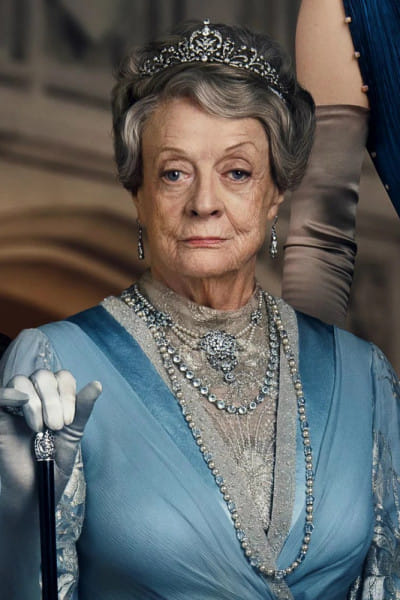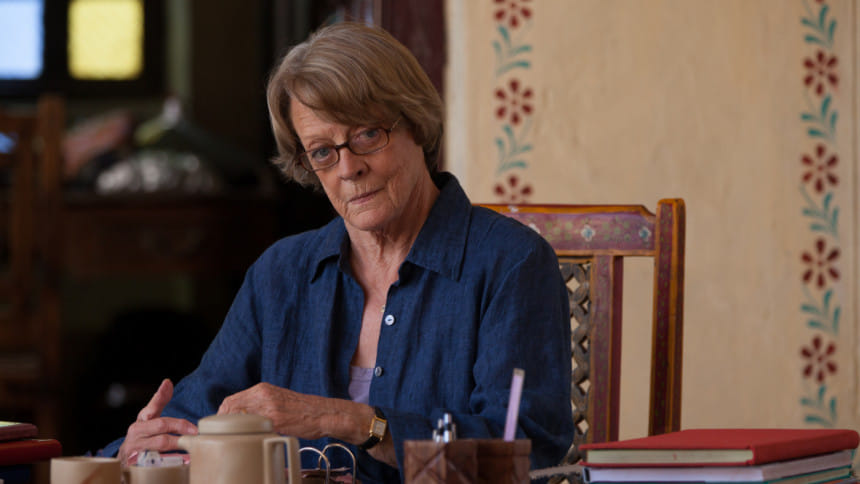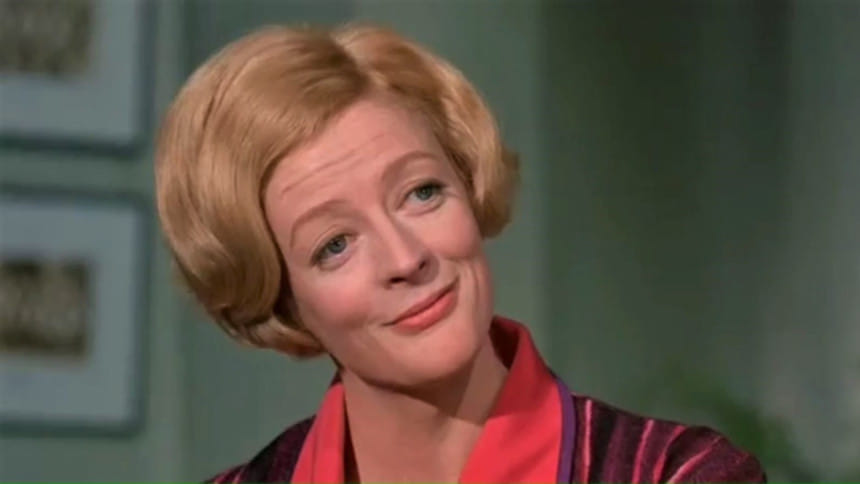A contemplation on the cinematic brilliance of Maggie Smith

It's a curious thing, the emotional weight we feel when an actor we admire passes away. The grief feels strange and quiet, almost disproportionate. We've never met them, and there was never any real possibility of a personal connection. Yet their absence feels profoundly real, as though someone who had unknowingly become a part of our lives is suddenly gone. It's far from the raw, visceral pain of losing someone close, but very close to a slow, simmering sadness, more like the loss of a distant but cherished companion. I've asked myself this question each time I've felt this quiet sense of loss from the passing away of a favourite artiste—why does it feel like losing a personal connection? Why does it resonate so deeply? And I find myself asking it again today, with the passing of the brilliant actress Maggie Smith.

Like many of my generation, my introduction to Maggie Smith began with "Harry Potter". As Professor McGonagall, Smith exuded an understated power, an authority that transcended the typical "stern teacher" archetype. McGonagall's wisdom and compassion were present not just in the lines she delivered but in the subtleties of Smith's performance, the softness in her gaze, and the hesitation in her voice when reprimanding students she clearly loved. Beyond the clichéd role of a disciplinarian, she embodied the quiet strength of a protector, a mentor whose loyalty ran deeper than the rigid rules she enforced. This portrayal captivated me, but it wasn't until I saw her in "Downton Abbey" that I began to grasp more spectrum of her brilliance.
As the Dowager Countess of Grantham in "Downton Abbey", Smith revealed a remarkable ability to blend biting wit with emotional depth. The Countess is a master of the scathing one-liner, but what fascinated me most about Smith's performance was the vulnerability she allowed to peek through. Beneath the sharp remarks and aristocratic hauteur lay a woman navigating a rapidly changing world, fighting to maintain control in an era that was slipping away. The beauty of her portrayal was in the delicate balancing act: she was acerbic, but never without empathy. In moments of quiet reflection, when the camera lingered on her face after a particularly cutting remark, you could see the weight of her experience, the sadness of someone who had seen the world change too many times, and the tension between pride and love. What did it mean for this fiercely traditional woman to hold onto dignity in a modernising world? The role could have easily veered into caricature in the hand of a lesser actor, but Smith's control, her ability to layer sarcasm with subtle gestures of affection, made the Countess a deeply humane figure. And of course, she had some of the best one-liners in TV history in Classic Smith-esque witticism — "I am never wrong," she quips, "I thought I was once, but it turns out I was mistaken," — reminding us that humour can be both cutting and deeply insightful.

This encounter with Smith's versatility sparked a desire in me to explore her other work, beyond the iconic, popular roles. I soon found "The Best Exotic Marigold Hotel", where she played Muriel Donnelly, a character initially confined by bitterness and prejudice. To date, I'm struck by how Smith's portrayal refuses to oversimplify Muriel's transformation. The change wasn't a dramatic, redemptive arc but a series of small shifts in behaviour and attitude. How often do we see characters evolve so quietly, without the dramatic music or climactic speeches? Smith used restraint as her most powerful tool, allowing Muriel to evolve in increments, her body language and tone softening in ways that felt organic, and unforced. It was all in her eyes, the way her body subtly relaxed over time, the softening of her once-piercing voice.

However, it was through her lesser-known roles that I truly began to appreciate the genuine versatility of Maggie Smith's artistry. One performance that particularly struck me was in "The Lonely Passion of Judith Hearne" (1987). In this film, Smith delivers one of her most haunting portrayals: a woman whose life is steeped in loneliness and spiritual disillusionment. Judith Hearne is a character filled with unfulfilled desires, but rather than playing her grief in broad strokes, Smith buries it beneath layers of composure, only letting it surface in small, devastating moments. As a viewer, it quickly becomes apparent that her absolute command of internalised emotion is the true star of the performance. In one scene, Judith prays for divine intervention, her voice trembling with a flicker of hope that she knows, deep down, will go unanswered. It's a performance that could have been easily exaggerated, but Smith holds back, allowing the weight of her character's entire life to settle in her eyes and posture. The result is far more powerful because it feels so achingly real.

Smith's skill in playing characters who are often on the fringes of society, grappling with isolation or displacement, comes through even more strikingly in "The Prime of Miss Jean Brodie" (1969). In this role, she brought to life a character who is both an inspiring mentor and a deeply flawed, even dangerous, figure. Miss Brodie is charismatic and controlling, filled with self-righteous conviction that ultimately leads to her downfall. What Smith does so brilliantly in this film is showing us the seductive charm of Brodie's persona while simultaneously hinting at her unravelling. There's a scene where Brodie, addressing her students, speaks of her belief in shaping young minds, and Smith delivers the speech with a kind of fervour that makes you admire her even as you begin to question her judgment. Smith navigates Brodie's delusions with a precision that makes the character's eventual downfall not only inevitable but deeply tragic. She allows Brodie's charisma and ego to coexist in tension, leaving us conflicted about whether to pity her or condemn her.

As I dug further into Smith's filmography, I was continually struck by her ability to transform apparently archetypal seeming roles into fully fleshed-out characters with intricate inner lives. Each of these performances, from the grandiose to the understated, highlights Maggie Smith's unparalleled ability to inhabit the internal landscapes of her characters. She found the humanity in every role, bringing forward the emotional contradictions that define us all. What makes her history of work so powerful is that she never settles for easy interpretations. She explores the messy, often uncomfortable truths about people — their flaws, their fears, their hidden desires, giving us characters who feel lived-in, real, and profoundly relatable.
This unwavering commitment to truth in her performances is precisely what makes Maggie Smith's passing feel so profoundly personal. Through her sheer brilliance in acting, she offered us reflections of ourselves, capturing the full spectrum of our complexities, contradictions, and quiet struggles. As I dive deeper into her body of work, it becomes glaringly clear that my personal grief also stems from the deep emotional bonds I formed with the characters she played. In a way, those roles allowed me to confront my own complexities and navigate the world around me with a fresh perspective. So, in losing Maggie Smith, it feels as though I'm losing a part of that vital reflection. And I think this is the brilliance of a true artiste: to forge connections that transcend the screen, to awaken emotions we didn't even know were there, and to leave us irrevocably changed.
Wand raised, Professor!
The author is a PhD researcher in Cinematic Studies at Ulster University, focusing on diasporic South Asian films.

 For all latest news, follow The Daily Star's Google News channel.
For all latest news, follow The Daily Star's Google News channel. 









Comments